Pyrrhus of Epirus: History's Greatest Forgotten General and Why You Should Wear a Helmet
Ive been writing pretty consistently about space lately, so I thought I would take a break from that today in order to share one of my other passions...history! There have been a lot of excellent leaders, ruthless generals, ingenious scientists, meticulous historians, vivid authors, etc. throughout history. So I guess one of the things I want to discuss with you in my post today is why some of history's greatest people haven't survived the winds of time to remain part of public knowledge. So, without further ado, lets talk about Pyrrhus of Epirus.
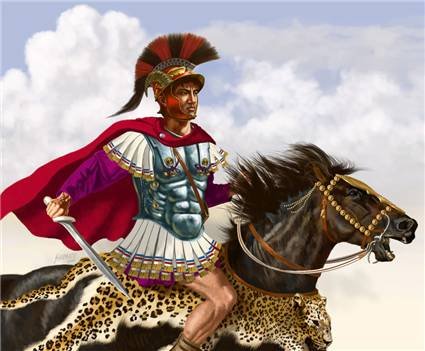
Pyrrhus of Epirus - (Source)
I graduated from American University with a BA in International Studies in December 2015 with a regional focus on Asia and a specialty in Environmental Sustainability and Global Health. I studied abroad at National Chengchi University in Taiwan.
Most of us have heard at some point or another of Alexander the Great, Hannibal of Carthage, Julius Caesar, and even Scipio Africanus. They are known to history as the great generals of antiquity, the men who made the world tremble and fall to its knees at the approach of the stamping feet of their great armies. These men were leaders, conquerors, killers, and if nothing else, preserved in history as some of the greatest military minds the world has ever seen. Who now remembers Pyhrrus of Epirus?
According to Hannibal of Carthage, that great leader who once managed to stealth march an army of war elephants and over 25,000 infantry through the Pyrenees and the Alps to surprise the Romans in their beds, Pyrrhus was the second greatest military mind of all time, after only Alexander the Great. So why is it that we do not remember him?
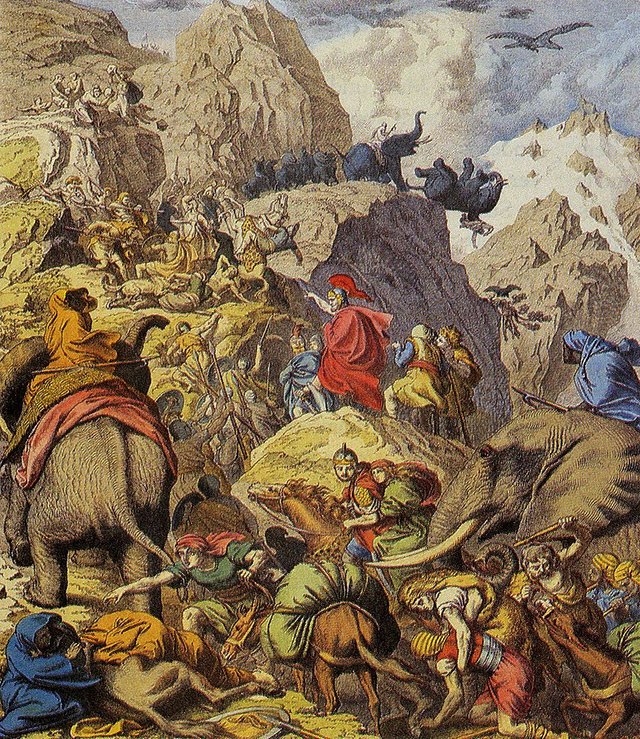
Hannibal Crossing the Alps - (Source)
Early Life
Pyrrhus lived a life of blood and warfare. Born in 318 BC to Aeacides, king of Epirus, he first witnessed violence when his father was dethroned at the age of two. He would go to live in refuge in the court of Glaukias of the Taulantians until the age of 16, when Glaukias helped him retake the throne of Epirus. Then, just four years later, he was dethroned again by Cassander, the king of Macedon (the most powerful kingdom in the region.) Basically, by the time he was 20 he had witnessed and taken part in 3 separate coups. The rest of his life would mirror that early exposure to violence.
The Pyrrhic Wars
The moments that truly defined his life took place from 280 BC to 275 BC in Pyrrhus' ultimately futile attempts to defeat the Romans. By the time of Pyrrhus' coming of age, the Romans had already consolidated the large majority of the Italian peninsula under their rule. Well, Pyrrhus was not content with kingdom of his fathers, or even the kingdoms around him. He dreamed of an empire like that of Alexander the Great, and his great personal strength and confidence led him to believe that he was capable of it. As a result, when the southern Italian city of Tarentum called for aid against the Romans in 280 BC, he immediately departed with 25,000 infantry and a few dozen war elephants.
Here is where Pyrrhus came into his own. He employed two military innovations to great effect to defeat the Romans.
The phalanx had been the central unit of infantry in Ancient Mediterranean warfare since approximately the 8th century AD, and as the Roman legion was not devised until something like 100 BC, the Romans still utilized it as well. While the phalanx was a highly effective military unit, Pyrrhus recognized that its weaknesses were lack of mobility and the difficulty of maintaining the formation. He thus improvised by filling in gaps in his phalanxes with light infantry conscripted from local Italians (which came to be known as thureophoros, and guarded his flanks (which were vulnerable due to the lack of mobility) the same way.
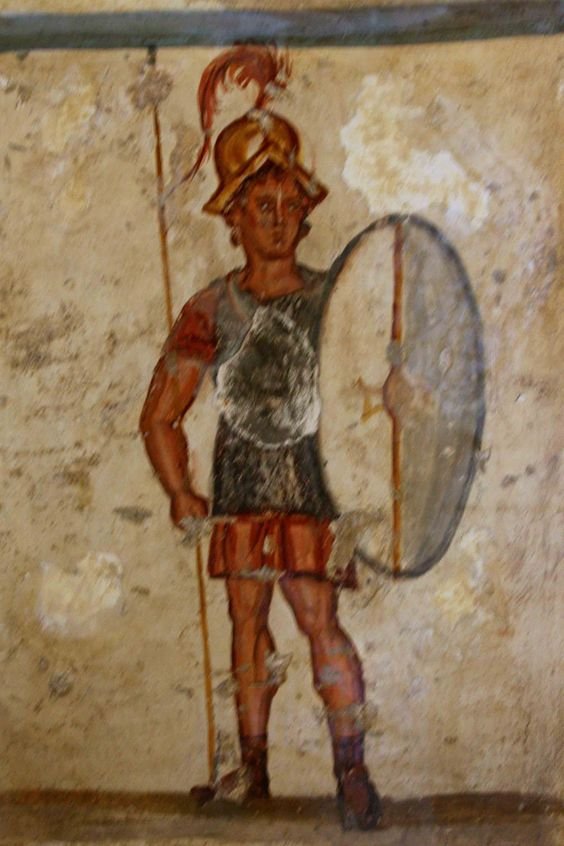
The Thureophoros, notable for the javelin and ovular shield - (Source)He also armed his small cavalry force with javelins, which greatly improved the offensive potential of his military.
He used these innovations to win first the Battle of Heraclea in 280 BC, and then the Battle of Asculum in 279 BC. However, Pyrrhus had a far smaller army at has command than the Romans. Plutarch, who wrote a biography of Pyrrhus, writes that when one of Pyrrhus' commanders congratulated him after the victory at Asculum, he replied
"If we are victorious in one more battle with the Romans, we shall be utterly ruined". This is why a victory that leads to a resulting great loss for the victor has come to be known as a "pyrrhic victory."
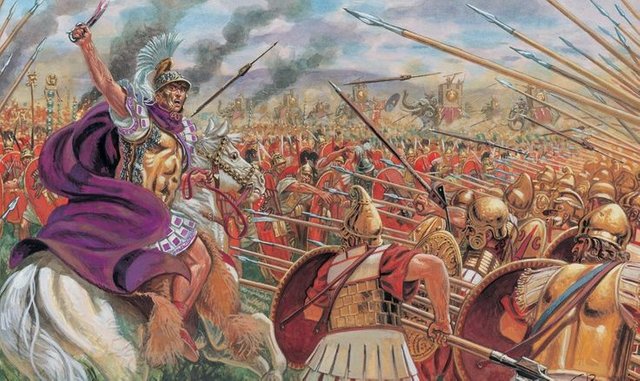
Battle of Asculum - (Source)
He took this quote to heart, and withdrew from mainland Italy. He took his army to Sicily in response to an invitation from the native Greeks to help them fight off the Carthaginians. Upon succeeding, they crowned him King of Sicily, a title he would hold for only three years after his despotic rule led to a Sicilian uprising.
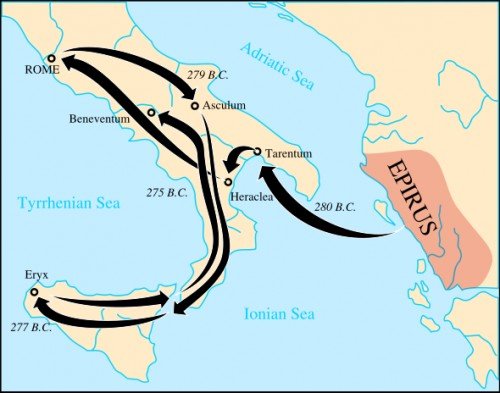
Pyrrhus' exploits in the Pyrrhic Wars - (Source)
Later Life and an Ignominious Death
After returning to mainland Italy and being defeated by the Romans at Beneventum (where it should be noted, he was vastly outnumbered), he returned for the first time in 5 years to the seat of his kingdom in Epirus. From here he continued his conquering ways, managing to conquer Macedonia despite his greatly depleted treasury, army, and Macedonia's great might.
However, continuing the capriciousness he had shown his whole life, he ended up essentially abandoning Macedonia just a few short years later in an attempt to conquer Sparta. As the story goes, as he was killing and slaughtering his way through the streets of Sparta, an old woman on the roof of a nearby building threw a tile that hit him in the head, stunning him, and allowing a Spartan soldier standing nearby to finish him off. Not a very noble way for one of the greatest generals of all time to die.
Lessons to be Learned from his Life (and Death)
I think there are a few lessons to be learned from his life. Despite his phenomenal military prowess, both personally and tactically, he left almost no mark on history because
- He was very adept at conquering a city or state, but terrible at holding it. He never learned the valuable (and seemingly obvious) lesson that you cant build an empire if you let everything you've gained be taken while your back is turned. He could have learned a thing or two from Alexander the Great on that front.
- He was incredibly capricious in his ways, and throughout his life never once seemed to really decide what he wanted (other than his vague "empire.") He would have benefitted from having a plan of action and sticking with it.
- Wear a helmet.

Wear a Helmet - (Source)
I think all of those translate to real life lessons for people today. Letting go of a bird in order to catch another bird means you ultimately still end up with one bird. Changing your mind about everything all the time makes it hard to make real progress in any direction, and feeds further into lesson #1. And finally, life is dangerous. Wear a damn helmet.
Sources
- https://www.britannica.com/biography/Pyrrhus
- https://www.britannica.com/place/ancient-Rome#ref213012
- http://www.livius.org/articles/person/pyrrhus-of-epirus/
- http://www.hyperhistory.com/online_n2/people_n2/ppersons2_n2/pyrrhus.html
- https://faceintheblue.wordpress.com/2010/12/31/pyrrhus-and-hannibal-what-great-enemies-taught-rome/
Great and entertaining history lesson as content.
Thanks! I try to make everything I write as accessible as possible to people who might not be history buffs like me. People who usually write about history are not always known for being the most amazing authors. ;)
I am a history buff too. Military history fascinates me because I always wanted to be a geo-political analyst.
Interesting but terrible to be forgotten!
It's that true of most conquerors? They are good at conquering but suck at the mundane work of managing a kingdom.
me encanto esta gran leccion
Great post, you have an excellent writing style :D
A great general maybe, a useless statesman for sure. I think Hannibal nominated him in second place just to annoy the Romans :)